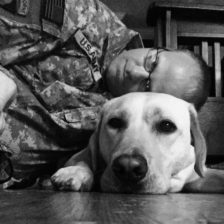Every so often I am asked what it is like to be a military wife. Some questions are, “How did you handle deployment?” or “what was it like living on a base?”
And usually I say something like, “well, my husband’s not deployed, he’s returning home.”
That sometimes gets an odd look, and a sympathetic smile, but truth is, I feel that Sam is still processing his return home.
Sam was in the army for 12 years, and had it not been for an injury that caused some serious problems, he’d probably be in for 12 more. His body just couldn’t handle what war did, and so, he was medically retired. A choice that was difficult and not his own, but it was the hand/card he was dealt.
Strictly speaking, “deployment” refers to activities required to move military personnel and materials from a home installation to a specified destination. For service members and family members, it means so much more.
Even if we haven’t gone through the deployment phase together, we are in the process of being home, returning to civilian life every.single.day.
You see, when one (especially the service member) preps for a deployment, there’s medical evaluations and appointments to keep them at their readiness level. That’s no different in retirement from the military, or the coming home process. While we don’t receive orders to mobilize, Sam does receive appointment reminders, medical evaluation, if you will, and he prepares for his life as a civilian daily. It might require a pep talk, but not one that he would have received or given his soldiers, but there is a small amount of prepping oneself for the day, week, job, or task at hand.
I would consider Sam’s work environment much like a deployment. It can be a war zone, a battlefield, unexpected moments could pop up at anytime. It is also a stressful time because the reality of it is, in his profession, he is still surrounded by the invisible wounds of war every single day. Day in and day out is a battle, not only with his own memories, triggers, emotions, feelings, reminders, and intrusive thoughts, but those of others, peers, Veterans from various eras or combat theaters who also have to prepare themselves to return home. Therefore, Sam’s performance on a daily basis involves planning and preperation at times, being able to speak about the effects of war and how to navigate life is just as important, which to me, seems much like a deployment–maybe just a little less chaos at times.
Some soldiers, much like my husband, are in the reintegration phase. Now, this phase is key because many of our Veterans are struggling with this very concept and they’ve “been home” for quite sometime. When one transitions from military culture to civilian culture, it can be a challenge. There might be training, counseling, medical appointments, stress, sleepless nights, the list could go on–and for some, this transition is not as difficult for some of the Veterans in society today. It might be hard for some Veterans to find work, it may be a struggle for some Veterans to leave their home. We must not ever assume that these Veterans will “just get over it,” because this is such a challenge, such a difficult transition for some who have served. Many support services are out there, ready to help Veterans, and families, it is just a matter of letting them know about the services they need to make the readjustment easier.
Services that have been helpful to us, at least in my opinion, are the ones that are close to us: the VA. Say what you will (and trust me, I could say a lot), there are some really, really good folks in the VA doing great things for our Veterans. I see that in therapy sessions with Sam and Dr. Thompson. Sam is medically covered through the VA, and if you think it is a challenge to navigate healthcare, you may or may not know about the rating system the VA has, or how to go about getting your care set up with a provider. Trust me, I’m still learning.
This Able Veteran—you all may know about this organization, but they are doing amazing things for our Veterans. I see this daily. This organization provides service dogs to Veterans at no cost (yes, you read that correctly, my friends). If you want to know more, ask. I know a guy who went through the program. He’s got an absolutely wonderful friend, companion, and “son” named Memphis.
Friends and family–I have been so lucky to meet other military spouses (see you soon, Corrine!), I’ve been able to count on friends for a listening ear, family members for a hug and maybe even a few tears, but our support system has been outstanding. I know I’ve heard Sam say at times that he would not be here today with out the support and love he’s received. I feel the same. We are so fortunate to have some close friends and our family who love us no.matter.what. Wouldn’t that be amazing if all our Veterans had the support of family, friends, organizations, and the VA? I picture that every so often–Veterans getting the help and support that they need, and I can’t help but get teary eyed.
We have good days and we have bad days. Days where Sam’s memory fails him. Days where Sam’s body just gives up. But, we have each other. We have a house full of love, laughter, and dogs. I can’t imagine this journey with anyone else, and this return home, it is so important. Knowing that, and keeping on the path of wellness, recovery, and healing helps. That is our return home.



The man who went to war came home and felt broken. He struggled. He found hope. He found love.

Thank you for your service, it’s an honor working with and for my Veterans. Proud to know you and Memphis.